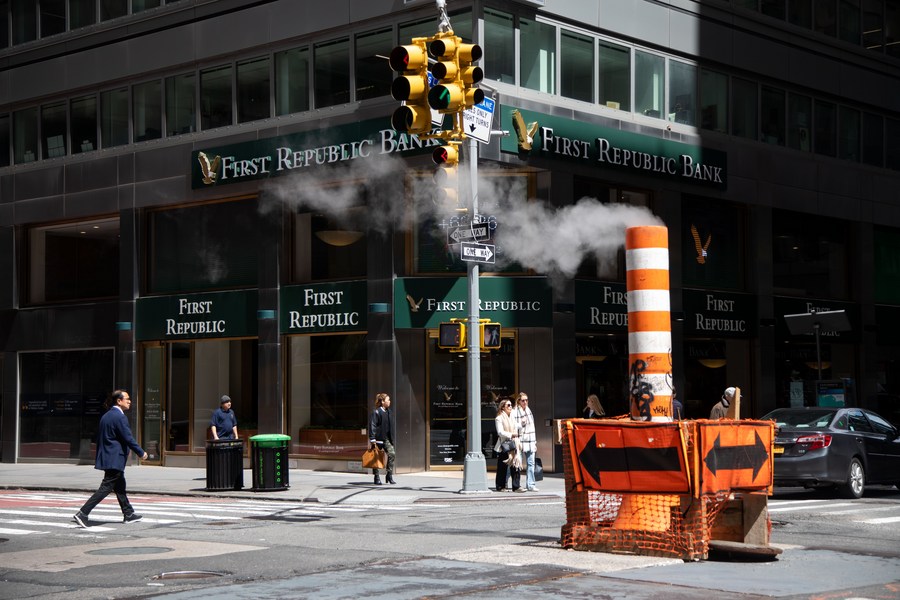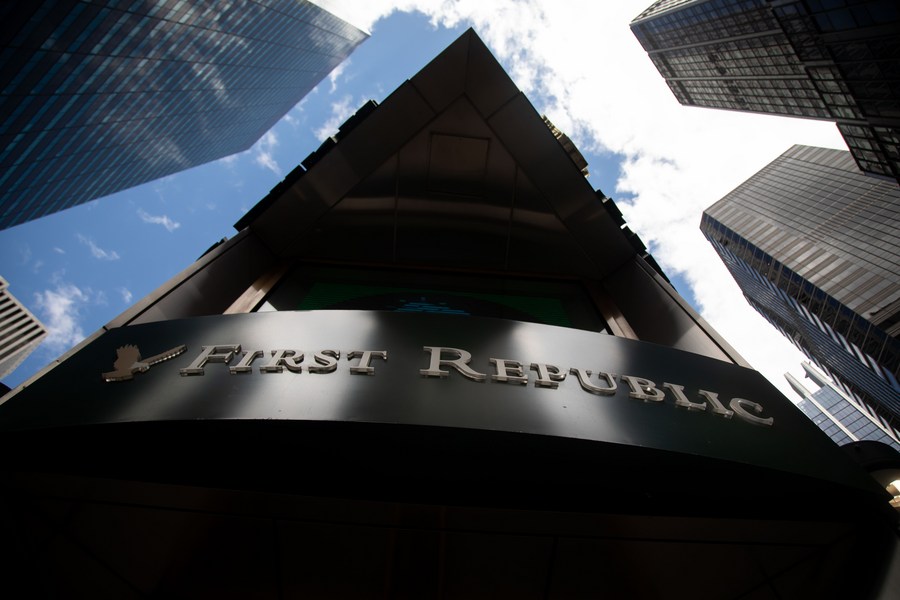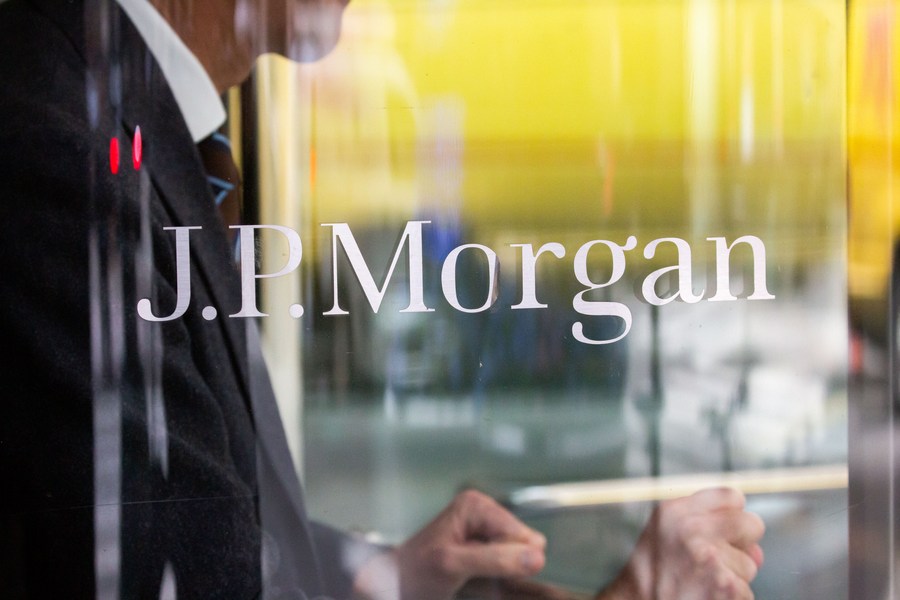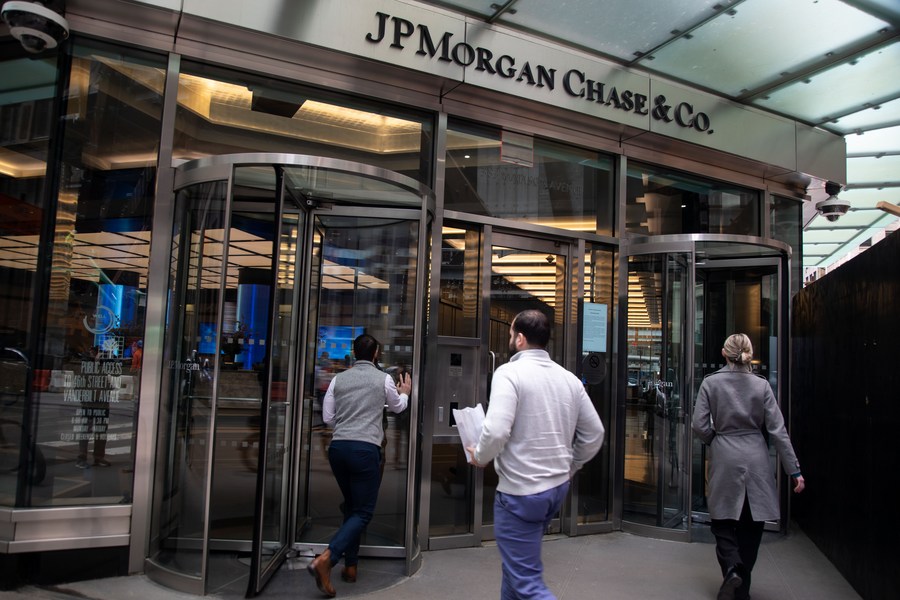
Photo taken on May 1, 2023 shows a branch of First Republic Bank in New York, the United States. (Photo by Michael Nagle/Xinhua)
The U.S. regulators are doing well at dealing with the crisis, but another part of the government, the Federal Reserve, is really contributing to the crisis by raising short term interest rates too high and too quickly, said David Kelly, chief global strategist with JPMorgan Asset Management.
NEW YORK, May 1 -- U.S. top banking group JPMorgan Chase announced on Monday it has acquired the substantial majority of assets and assumed the deposits and certain other liabilities of First Republic Bank from the Federal Deposit Insurance Corporation (FDIC).
The FDIC was just appointed as the receiver of the San Francisco-based First Republic Bank, which was closed by the California Department of Financial Protection and Innovation early Monday.
The government-orchestrated rescue deal, however, is unlikely to prevent more U.S. banks from falling into troubles or reverse recessionary pressures on the U.S. economy, analysts say.

Photo taken on May 1, 2023 shows a branch of First Republic Bank in New York, the United States. (Photo by Michael Nagle/Xinhua)
RERUN OF RECEIVERSHIP
Though the deal makers managed to get it done before the opening of U.S. markets on Monday, they only had presented a rerun of receivership of First Republic Bank following the steps of Silicon Valley Bank (SVB) and Signature Bank earlier this year.
JPMorgan Chase signed a purchase and assumption agreement with the FDIC after it won in a government-driven bidding process.
"In carrying out this transaction, JPMorgan Chase is supporting the U.S. financial system through its significant strength and execution capabilities," said JPMorgan Chase in a release.
JPMorgan Chase would buy around 173 billion U.S. dollars of loans and about 30 billion dollars of securities from First Republic Bank.
Meanwhile, JPMorgan Chase will assume all deposits of First Republic Bank which totaled around 92 billion dollars, including 30 billion dollars of deposits provided by 11 large banks in March.
First Republic Bank's 84 offices in eight states will reopen as branches of JPMorgan Chase on Monday, and all depositors of First Republic Bank will switch to JPMorgan Chase and have full access to all of their deposits, said a release by the FDIC.
JPMorgan Chase didn't acquire corporate debt or preferred stocks of First Republic Bank, and the FDIC estimated that the receivership of First Republic Bank would cost Deposit Insurance Fund about 13 billion dollars.
The FDIC and JPMorgan Chase also inked a loss share agreement on single family, residential and commercial loans of First Republic Bank, allowing the two sides to share in the losses and potential recoveries on the loans.
The transaction is expected to generate more than 500 million dollars of incremental net income per year to JPMorgan Chase, excluding around 2.6 billion dollars of one-time post-tax gain or approximately 2 billion dollars of post-tax restructuring costs expected over the course of 2023 and 2024, according to the banking giant.
First Republic Bank saw material outflow of deposits since its release of Q1 operating results on Apr. 24, considering it had 102.7 billion dollars of total deposit by Apr. 21.
It's reported that First Republic Bank recently pushed for the sale of its partial assets without falling into receivership but struggled to strike a deal.

Photo taken on May 1, 2023 shows a sign at the JPMorgan Chase & Co. headquarters in New York, the United States. (Photo by Michael Nagle/Xinhua)
FED TIGHTENING DESTABILIZES SYSTEM
First Republic Bank is the third U.S. regional bank put into the FDIC's receivership since March in the ongoing regional bank turmoil, and it's ranked as the second largest bank to fail in U.S. history.
The U.S. regulators are doing well at dealing with the crisis, but another part of the government, the Federal Reserve, is really contributing to the crisis by raising short term interest rates too high and too quickly, said David Kelly, chief global strategist with JPMorgan Asset Management.
In an interview with Xinhua on Monday, Kelly said the turmoil with First Republic Bank, SVB and Signature Bank "comes from these two factors, one, interest rates are going up very fast and damaging the value of their assets and two, interest rates going up very fast is causing depositors to move money out of these banks into money market funds, and that is squeezing the bank for both sides."
The Federal Reserve waited too long to raise interest rates and its aggressive tightening is "destabilizing system," said Kelly.
The Federal Reserve was correct to blame itself for some problems with SVB, added Kelly, referring to a recent Fed review on its supervision and regulation of SVB.
The troubles at SVB, Signature Bank and First Republic Bank are symptomatic of a broader credit crunch and economic downturn underway and that's far from over, said Will Denyer, chief U.S. economist at Gavekal Research.
Thanks to the liquidity support provided by the Federal Reserve, U.S. banks are only now planning to sell assets in response to deposit outflows that occurred a full month ago, said Denyer in a recent research note.
The Fed liquidity support is helpful to banks but is not a permanent solution, said Denyer.

People enter the JPMorgan Chase & Co. headquarters in New York, the United States, on May 1, 2023. (Photo by Michael Nagle/Xinhua)
Some U.S. banks face the unenviable choice between selling assets at a loss or enduring a prolonged period of negative net interest margins. Clearly, First Republic Bank and PacWest Bancorp have chosen the first route and the market is not enthusiastic about it, according to Denyer.
The U.S. banking sector is expected to see substantial restructuring in the coming period and big banks are likely to absorb or acquire many medium and small-sized ones, which are unable to survive the turmoil, said Tianyang Wang, associate professor in the Department of Finance and Real Estate at Colorado State University.
The reserves of many medium and small banks are eroded as a large quantity of deposits flows to the money market, said Wang in a recent webinar.
The U.S. economy experienced a credit boom from 2020 to 2022 on the back of unprecedented policy stimulus, and financial conditions have now tightened enough to turn that boom into a bust, said Denyer.
Kelly echoed, saying that he was worried about a credit crunch, whereby small banks are less willing to lend to small businesses and that could cause the economy to slow down more rapidly.
Credit crunch and lift of lending standards would further reduce monetary supply in the United States, which would make it more likely for the U.S. economy to see a hard landing, analysts say.












